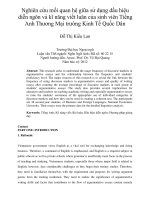Brands on tiktok of National Economics University
Bạn đang xem bản rút gọn của tài liệu. Xem và tải ngay bản đầy đủ của tài liệu tại đây (110.19 KB, 15 trang )
Brands on TikTok
Step by step to be pro in TikTok
Abstract
TikTok has fast become the world’s most talked-about social network — in the news and
popular culture, the relatively new player in the fray presents an opportunity to reach
consumers in a new, relatable
way and, most importantly, appeals to the holy grail of demographics.While any major brand
with the right marketing budget can reserve one of TikTok’s many (and growing) media
products, implementing
a solid organic channel strategy forTikTok is essential for smaller brands,individuals and
agencies.This paper provides a practical guide to being successful on TikTok as well as clear
initial guidance to consider whether the platform fits into your wider social strategy. It also
provides advice on execution, brand examples and pragmatic starters to help you and your
team feel educated on the platform.
THE STORY SO FAR
In September 2016, an app called A.me was launched with a focus on short music
videos, created and posted by a tar- get market of millennials. 1 The app was soon
renamed Douyin, and in just under a year the user base multiplied.The app
continued to proliferate, and TikTok, the international version of Douyin, became
popular outside of China, reaching 2 billion downloads worldwide 2 in April 2020.
TikTok now boasts stars such as Will Smith (45 million followers), Jason Derulo (39
million followers) and Dwayne ‘The Rock’ Johnson (29 million followers) and also
creates its podium of celebrity influenc- ers like Addison Rae, Dixie D’Amelio, Bella
Poarch, Michael Le and, of course, the big- gest to date (at the time of writing),
Charli D’Amelio, with over 100 million followers.
Finding a meaningful, effective and manageable way for a brand to be pres- ent on
TikTok can seem like a science — or maybe just too much work. It is likely, however,
that there is some pressure to be present on TikTok.This paper is designed to do
two basic things:
1. Support you in speaking from learned experience when educating yourself and
colleagues on the world of TikTok.
2. Providing first steps and best practice advice to get a TikTok brand strategy
started on the platform.
BUCKING THE TREND
Photography, the age of creativity on the internet, and identity have driven growth
on social platforms over the last decade.As this growth has been happening, a
paral- lel discussion about privacy and personal relationships has become a thread
that we have all leaned into.Watching someone’s day has become more of a
curated look at their life than a real lens, and filters have become more of a
metaphorical thing than just gel on a camera lens. Social net- works adapted to this
change, and brands on the platforms could carefully curate how their brands looked
and felt behind the filter. Brands had an identity — and a lack of personality on the
platform was often accepted, almost expected as the way brands operate.
Timeline-based internet social media (stories, the ‘timeline’) armed the every- day
person (including influencers, foes or friends) with tools to collect, disseminate, post
and analyse news and information alongside traditional news outlets and
journalists. In many ways, social media was challenging how journalists reported,
and as a finale to this closing of the loop in news journalism, between 2016 and
2020, Twitter became the primary megaphone for the world’s most significant seat
in office, the US presidency.TikTok became news itself as it was swallowed up into
the fake news cycle, claiming a foreign power could use data from US users — the
app was banned in some nations and nearly suffered the same fate in the USA.
Video has become the most influen- tial media on the internet. Many plat- forms
have seen their most incredible rise because of video or a video-based addition to
the platform, but until now, audio has been relatively overlooked — muted at first
and always second to visual stimulation.
The most popular social networks became video-based inbound traffic sources for
news websites, and then native news viewing through video became more pop- ular
on platforms such as Instagram and Facebook. Live editing, curation and hav- ing
an angle on the news is essential, but TikTok, the young new challenger in the
social sphere, is shaking things up, requiring accuracy and credibility in a world of
spin. For example, where ephemeral story-based content had made such an impact
on news journalism, TikTok is already making its mark on the world of music
journalism. Traditional mainstream music journalism, ‘largely uninterested in
promoting discov- ery’3, is being turned on its head by upstart music blogs on the
social network of the moment, TikTok. The emergence of music journalism on the
platform was always expected.
Now that it is happening, we are beginning to see how it could change the way
record labels, artists and consum- ers approach music discovery. Traditional
blogging cannot compete with the viral nature of the TikTok algorithm. Music
discovery for Gen Z is served primar- ily through Spotify playlists, but a plat- form
designed around discovery can take flight here with music. TikTok accounts such as
MostleyMusic, Loveinamovie and Hahakcoolgottagobye are run and oper- ated by
Gen Z individuals, now balanc- ing incoming submissions from significant labels,
conversations with artists, and serv- ing their 300,000+ followers — all while trying
to pass finals.3
This disruptive change to music news, combined with the need for credibility, is not
limited to the world of journal- ism.Trustworthiness in an age defined by privacy and
identity is crucial, and where other platforms are carefully manicured brand powergardens,TikTok has a sense of purity. Do not be cheated by the nature of TikTok,
which may look and feel like very many video platforms brand market- ers already
advertise on but whose rules are significantly different.
YOUR BRAND AND TIKTOK
Very broadly, the question of whether social media is a right fit for your brand is
answered very simply: yes.What is more important to ask yourself is, who would
have a relationship with your brand on social media? Even for a B2B brand, even
something that has very little con- sumer interface such as manufacturing or
semiconductors, employer branding, for example, is an excellent way to show the
culture of your business and attract great candidates (see ‘Rules of Engagement’
and some guidance on authenticity in the fol- lowing sections).
With TikTok, the strategic opportu- nity for brands becomes somewhat nar- rower,
and while there is a suite of paid ad products on TikTok, the bigger question you
need to answer is, what relationship a creator has with your product or ser- vice?
Consider TikTok an opportunity to see how creative a community of makers can be
with what you sell. In 2019 Tony Piloseno, a university student who worked part
time at a Sherwin-Williams store, was fired by the business for using his work hours
and company equipment to cre- ate colour-mixing videos on his TikTok channel. 4 A
huge missed strategic oppor- tunity. To avoid costly mistakes like this and consider
whether TikTok is right for your brand, here is a quick test:
1. Would our product or service work on camera, either by a first-hand
demonstration or with an example? And does using our product or service on
camera fit with TikTok’s guidelines for content?
2. Can our product or service be pur- chased online?
3. Is the audience for our product or ser- vice using TikTok (see ‘Your Fellow TikTok
Users’, further on)
If the answer to these questions is yes, then TikTok likely has a place in your brand
strategy. The rest of this paper is designed to provide you with hands-on execution
knowledge to begin that strat- egy and work and to educate the rest of your team
on how the app works for a brand.
EUREKA! VIRALITY BY DESIGN
While it might seem like a ‘video’ plat- form at first glance,TikTok is very much a
platform designed for addictiveness. It keeps the viewer inside the platform — it
readdresses the role audio has to play when someone is using their phone, and it
reframes the experience and why the user has arrived here. But how do we
summarise some of the unique features of TikTok? When talking to your colleagues
and executives about TikTok, here is what you need to focus on:
Just for you
Some of the most heavily guarded secrets in the brand world create the most fame
surrounding the secrets themselves. John Pemberton shared the famous Coca-Cola
recipe with only four people before he died in 1888. 5 Even the identity of the two
employees in possession of the Coca-Cola secret is itself a secret. 6 These days that
recipe is known to be more of a marketing strategy rather than a real trade secret,
but just as physical products have their secrets, the digital comparatives are indeed
no dif- ferent.While this brand marketing magic around recipes like Dr. Pepper,
Coca-Cola, KFC and Irn-Bru have become infamous for their secrecy, the TikTok
secret war- rants just as much fame — since it is as valuable and central to the
product, it is essentially the product itself.
Netflix, a pioneer in digital consump- tion through algorithms, may well have
already burst the bubble on any TikTok algorithm secrets years before, when, in
2013, they introduced a smart, but primar- ily under-the-radar,algorithm
surrounding the ‘My List’ feature on the platform. Star ratings were removed and
replaced with a thumbs up or thumbs down on content; however, behind the
scenes, the removal of this rating was replaced with ‘My List’ — both a handy
bookmark for shows you want to watch, but also an incredible iden- tifier for Netflix
of shows that you want to see more of or save to your library for quick reference
later. ‘My List’ is essential to both the user and the platform. 5,7
I cannot confirm or deny the contents of TikTok’s algorithm, but here are some of
the crucial factors to consider that will ultimately feed the algorithm information:
Profile/Follow: As a matter of user expe- rience, the profile badge (with a +
to follow) is placed prominently at the top of the list of engagement buttons.
Con- sider this, however: If ‘For You’ is the page where a user lands, how
crucial is a follow?
Like:A double-tap and a hit on the heart on the right indicate that a user
likes the content. This information, paired with the duration of a user’s watch
(more importantly, if they finished the video) are all crucial data points.The
rules for likes are not dissimilar to those for other apps, but consider this one
unique asset: sound invokes a different response.
Comment: As with all social content, comments are central here, and, owing
to the nature of the TikTok content cycle, comments themselves can become
the subject of another post. Review how you can create content that inspires
comments first and foremost.
Share:You must have seen a video else- where on the social web that has
the TikTok logo burned into the video. TikTok is a capture, edit and sharing
app, beautiful and central to the video-sharing web. Sharing from inside the
app does prioritise sending it to a fellow friend on TikTok — although sweet, it
is under- mined by the apparent attraction to syn- dicating the video
elsewhere, on another platform. How will your brand embody that feeling of
TikTok while enabling content to be worth sharing? What makes people want
to repost?
Sounds: The centre of this platform, its raison d’etre — audio. This button
ena- bles the user to trace the originating sound (including music snippet),
where else on TikTok it has been used and, most importantly, to ‘use this
sound’ in their creation. Does your brand have sounds or jingles that are
unique and versatile?
●
●
●
●
●
These engagement buttons, paired with just the right amount of information on the
video, poster and audio, is presented to the user as soon as they arrive on the app.
One of the most prominent ad products, ‘top view’, provides brands with an opportunity to be the first native-style video a user sees when they arrive here (see ‘Paid
Formats’, later). TikTok uses data from all these engagement buttons to work fast
and serve you videos it believes you will want to watch next, curated for an ever
shorter attention span, trigger-happy thumb and tiny-screen thrill-seeking attitude
to reward the senses — all of this neatly wrapped up on one page where the user
always lands when they first arrive at the platform, con- veniently and lovingly titled
‘For You’.
This viral algorithm — one that tradi- tional blogging struggles to compete with — is
essential to the success of TikTok and to that of your brand marketing pro- gramme
on the platform.This algorithm and page present an interesting change in focus for
brand marketers, and later we will review how to rethink a content strat- egy to
work with this process; see ‘Rules of Engagement’.
Quick guide: Paid formats
In this piece, our focus is very much on organic TikTok brand channels, but for the
benefit of brand marketers and pri- marily for educating their co-workers, here is a
brief guide on the primary ad products on the platform:
Standard
Top View: Mimicking the user interface (UI) of TikTok, this unit provides
brands with the opportunity to be the first native content piece a user sees
on the platform, for a duration of up to a minute.
●
●
●
In-feed ads: Akin to the top view , these 15-second units look and feel like a
regular TikTok video; however, they include the necessary ‘#ad’ identification and a deep link to an external page or experience.
Brand Takeover: A little more jar r ing than the native top view, brands can
take over the first screen a user sees with a video or image full screen.
Non-standard
Branded hashtag challenge: This is non- standard; however, the original place to
garner engagement on TikTok is a hash- tag challenge, and here brands can own
the hashtag and aggregate activity on a branded hashtag page, an idea that Twitter
tried but failed to successfully capitalise on years ago.
●
Branded effects: This is an innovative corner of TikTok. The world of AR, 2D and 3D,
real-world environments can be sponsored by brands in creative ways.
●
Audio first
Other mobile-first social networks (ie Instagram) have enveloped the social experience around videos and photos;TikTok is built entirely for virality and uses the
most undermined sense to do that: audio. As a brand on TikTok, you will want to
consider what role audio already has to play with existing brand marketing — do
you have a jingle or a recognisable voice? What type of audio or snippet would be
synonymous with the tone of your brand? Give this some thought before you
continue.
As the first (and to date, only) ‘sound on’ platform, TikTok has upended a social
media marketer’s traditional abil- ity to churn out threads and themes of content
quickly — often described as ‘streams’. Audio is a medium that requires listening,
focus and intent behind the marketing. Later we will look at how this also means it
is so much eas- ier for even the least discerning TikTok follower to spot
extemporaneous brand marketing content a mile off (see ‘Rules of Engagement’).
YOUR FELLOW TIKTOK USERS
As you drop your brand into the world of TikTok, here is a guide on whom you are
joining.
Demographics
The USA, with more than 26.5 million users8 of the estimated 1 billion monthly
active user base,9 is made up of an engaged yet fugacious group of 18–24-year-olds
and a significant bystander group of 25–34-year-olds, altogether represent- ing over
50 per cent of its massive (US) user base. For brand marketers, however, a broader
look at the TikTok user base pre- sents one of the unique conundrums in the brand
marketing world; a quarter of (US) users on the platform are aged 45–64 — an app
that has grown so fast indeed proves to brand marketers that fads are not child’s
play.10
As brand marketers, it is also important to remind ourselves that many apps and
platforms, TikTok included, have a min- imum age limit of 13, but no structure
around the integrity of submitting one’s age when signing up.
User styles
Much like all the other social networks, TikTok serves users that come to the
platform for something a little different. TikTok has become much more diverse and
intersectional between different vis- its, meaning that one person could poten- tially
come to the platform for different reasons on different visits.
For a brand, this means that embodying the spirit of creation and consumption is a
crucial part of the TikTok experience — having an authentic presence (see ‘Rules of
Engagement’) on TikTok demands per- sonality, and the perfect account may well
incorporate a blend of all three of these types — styles of the user.
It is also worth noting that this is an extreme simplification of the TikTok user base,
representing a critical tipping point of information for brand marketers to succeed
on the platform. Here we cover the 90:9:1 of TikTok users, paddlers, swimmers and
divers, respectively.
While you review these and consider how to interpret this information for your
brand, it is important to be playful and soft with your thinking — TikTok frequently
exhibits unique characteris- tics, and different user styles are symbolic of the user
demands of TikTok, not their level of expertise. For example, do not be surprised if
you see a ‘paddler’ post- ing a video. Paddling the surface does not demonstrate a
deficiency of knowledge about the platform, but, as with the other user styles, is
more of an indicator of the users’ relationship with TikTok.
Paddlers
Remember, TikTok is not defined by a millennial age group; both baby boomers,
Gen X and Gen Z, appreciate different content threads here, and many first-time
users of the platform fall into this category. They are largely those who do not want
to delve beneath the surface but enjoy scroll- ing through a plethora of singing-goat
videos.TikTok could replace a great deal of time spent elsewhere; on average, a
pad- dler might spend twice as long as they do on any other social network in
TikTok.11 When you consider what ‘double’ can represent, it is immediately apparent
why Hollywood studios see such a threat from TikTok, but also such an opportunity.
In the winter of 2019, five of the major movie studios came to me asking how best
to understand TikTok for their brand. ‘I do not get it, why do my kids love it?’ is all
too often something that a hard-pressed movie studio executive might ask. For so
many other social networks, there are some effortless ways to quickly ‘get it’ (eg
Pinterest, Twitter, Snapchat), but for TikTok my advice is ‘use it’. Read the
comments, spend a few minutes on it through the day, jump in every few hours
ordays,andseehowitchanges,depending on you and your viewing habits.
Do your best not to ignore this broad slice of the user base since they primar- ily
curate the umbrella algorithm. In this sense,TikTok is much like stand-up com- edy:
you need an audience to test your materials, and these paddlers represent that
arable testing ground. For a little more on what I mean by ‘testing’, see ‘Rules of
Engagement’.
Swimmers
Although quiet, they make up the heart of the network. Comments are crafted with
care and humour,the occasional duet video and a broad, but often deep,
understanding of the most popular trends and creators. We can expect this
category of users to spend significantly more time browsing the platform than any
other type, merely because they have the most goal-oriented, focused method of
browsing the app. A part of their lives, it is symbiotic with their every activity, and
TikTok should be eter- nally grateful for their patronage.
In the brand marketing world, this group’s trends will determine the more long-term
user experience changes. For brands, this means that while this group does not
bring our attention to some niche trends, they can be a clear indicator of what is to
come on the platform,by way of mass user experience. Swimmers — akin to a
Reddit user or Wikipedia mod- erator — are crucial advisors or brand allies to enlist
when executing on TikTok. When crafting your brand strategy, con- sider how this
multitude of thumb-tapping troopers will respond to catalyse viewing and
commenting by others.
This group spends much more time on the app, typically with deeper use of
functions and more dedicated content generated around trends, and thus this group
could more commonly define product updates to TikTok such as its inte- gration into
Samsung smart TVs and its branded effects. Although essential road- map items,
they are often decided by how the swimmers are using them and what makes their
mind tick.Yes, you might be onto something by suggesting that I have a soft spot
for this slice of the platform — ‘swimmers’ are that group that keeps the life of
TikTok humble and relational.
Divers
Divers choose to create first and fore- most. In any textbook, you may identify their
characteristics as similar to those of a creator — the cardinal ‘c’ of Google’s
Generation C.TikTok has accelerated the focus on creation by putting some sophisticated but straightforward creator tools in the front and centre of its platform.
Hence, being a ‘creator’ just by traditional methods is a thing of the past on TikTok.
Anyone can create things, but it takes a master of communities and curation to
truly make it — step in, divers.
Divers create unique and relevant con- tent for communities or niche slithers of a
larger group.This is how aTikTok user can very often predict something about you
that makes you feel ‘seen’. In this sense, our divers feel a responsibility to consider what is on this community’s mind at that moment in time.This is a few steps
past social media management 101 — where content, themes and trends are a little
more niche and speak directly to specific communities, conversations and trends.
Only in the last decade, when con- tent has been abundant, have brand mar- keters
learned to appreciate the power of niche relevancy. When researching TikTok for a
famous American fast-food chain, we needed to provide a cross sec- tion on food,
culture and heritage — we had architected a credulously specific end point here;
honestly stabbing in the dark with expectations, but one search of an obscure
hashtag we saw in a comment and we found ourselves off-piste into the innards of
TikTok. A member of my team exclaimed,‘I guess we found the dark side of the
TikTok moon!’ Although not what we hypothesised, or expected, it was rich.
Specific, uniquely relatable niches exist in large, hidden volumes on TikTok, and
divers engineer them.This kind of think- ing is the holy grail of modern mass media
that only giants like Netflix had mastered thus far; ‘Show me a niche only I and a
handful of other people are interested in, and keep me there’.
RULES OF ENGAGEMENT
Social networking is very often compared to a good party; you have the right
people, the right environment, the right conversa- tion and bang! You have a social
network. Those rules still apply here, and you will see where this analogy still stands
firm, but TikTok shows us that how — even in its relative infancy, it bucks the trend;
unlike other social networks, it is focused on cre- ating an addictive and inseparable
environ- ment for your mind. Other social networks have been focused primarily on
good places to share content. If you are read- ing this, I expect your brand to
consider howTikTokcanplayaroleinsellingyour product or service. Knowing how to
carry your brand on TikTok is as much about knowing your brand as about knowing
the way the platform operates. This can be distilled into two essential rules if you
abide by which will ensure your brand is accepted into the community. Connect
authentically, and create adaptively.
1. Connect authentically
No doubt brands treat official social media channels in different ways — some see it
as a function of a specific department (eg PR), while some see it as a multifaceted
function of all depart- ments. Most have tweaked and laboured over the ‘tone of
voice’ of their social, where others are at the mercy of their legal department,
including disclaimers, terms, conditions and policies in tweets. As brand marketers,
we have become finely tuned to diplomacy between these departments, especially
in com- municating the role that social media can play for each of them.
More recently, and accelerated in the last four to six years, tireless social media
managers have evidenced how having a real person’s voice — not necessar- ily a
corporation — can work for even the old-fashioned of organisations.The arrival of
TikTok has accelerated that change in tone, so being present on the platform as a
brand means authentic connections are central.
‘Connect authentically’ means that instead of creating a polished video of your
executives, reading a script on screen, find a way to showcase stake- holders in the
most relatable way. Find moments of your business unique to it with its
customers/clients and employ- ees, and remember that the platform is viewed on
the phone, so it should be shot on the phone. Let the voice on the platform feel
personal — if you can, have your TikTok creative directed by one individual with a
clearly defined vision and voice.
As marketers, we caution you that it is all too easy for a brand to sound tone-deaf,
miss the mark and try to sound ‘woke’ when we might not be that. Authenticity
should be taken seri- ously on TikTok. Many in your team likely know the platform,
many browse it, but which member of your team is a ‘diver’ that knows the depths
of the TikTok content world and how the UI of the creative element of the app
works?
Content that you might see per- form well when considering ‘connect authentically’
includes the following:
●
Identity stories
●
Slice of life
●
Recycled sound
●
Duets
●
Challenges
2. Create adaptively
Note that earlier we briefly men- tioned content ‘streams’ — methods by
which marketers churn out threads and themes of content quickly.To date,
this threaded ‘streams’ method of content production has worked and has
kept followers on platforms like Instagram, Facebook and Twitter familiar with
the content they have arrived for. For the follower of a page, familiarity is a
com- fortable, easy-to-engage-with media, but what if we ignore those
followers for a moment?
As noted before, the main page in TikTok, ‘For You’, is based on a cura- tion
algorithm, and not entirely pages that you follow (though you may see
accounts you follow occasionally in the ‘For You’ page); thus, branded,
organic content on TikTok can be considered both a careful science and a
test and learn process.
The science: A TikTok user creates content about themselves, their lives, ‘do
it yourself ’ (DIY), food and travel, for example.
Test and learn: Content trends on TikTok will typically have a healthier half-life than
other social networks. The discovery method means that a content piece can
resurface to the top of the pile just as fast as it fell, and that motion keeps trends
alive longer.
It is not unheard of to post a video to TikTok, watch how it does (good or bad) and
then delete it if it is not per- forming. Experimentation on TikTok is essential to the
content creation pro- cess, and for real success on the plat- form, your brand must
consider how it will engineer that experimentation. If you work for a major brand
that could struggle with the somewhat organic content creation method of test and
learn here, the following would serve as crucial pointers:
(a) Formats, not streams: As we have discussed, trends, niches and streams can be slippery areas for preparing
content. So to keep things sim- ple, look out for the ‘formats’ and ways in
which your ‘swimmers’ are using content on the platform.Are characterselects still in vogue? Do duets include comments, or are glow-ups still the
way to denote change? Make a list of formats you see performing well and
consider them relevant for at least another 3–6 weeks.
(b) Experimentation attitude: Social media managers are typically extremely
creative, experimental people — they try and see and test and learn and
honestly sometimes fail.That is part of the process, and for so many other social
networks, other business divisions are protected from this process. With TikTok,
subscribing to that attitude is essential to con- tributing at any level.As brand
mar- keters, we must do as much work in the way we communicate and dis- cuss
success and failure on TikTok as we do creating the content itself. Consider how
you position TikTok
toyourbrand—isitpartofPRor
part of R&D?
Do not be afraid to take a break from
TikTok after you have started your account. Because TikTok prioritises ‘for you’ over
‘following’, you will notice there really is not a follower drop-off when you have not
posted something for a while. Followers are less likely to notice when you leave and
arrive back again, and while this can have some downsides, it generally helps with a
lack of cadence when you are testing and learning.
Create Adaptively is to embody the spirit of experimentation and know the beast
you are working with. On laying out a TikTok campaign plan for a cli- ent, one of our
producers drew up the schedule. From managing other social channels for this
brand, we had weekly editorial calendars and reviews, then monthly planning and
reporting — superior, neat methods to manage a successful social presence. TikTok
demanded a rethink of this method; after all, how can you be adaptable, learn and
grow if you only have a chance to review how you are doing each month?
Instead, consider more organic ways to review things; smart ongoing content
review documentation, sug- gestions from everyone on your sales team —
adaptability on TikTok should not cost you anything more to master, but you will
need to reconfigure some workflows.
Some content you might also see when considering ‘create adaptively’ includes:
●
DIY videos
●
Food
●
Travel
QUICK REFERENCE: CASE STUDIES
Inspiration is everywhere on TikTok, so I would encourage you to spend some
time writing down trend formats and popular brand posts you see as your
thumb leads you through. If you are short of time and need a few influential
brands to start with, however, here is how just three brands are using the
platform in different ways.
Washington Post
Dave Jorgenson, now a master of the TikTok universe, on his TikTok channel,
embodies qualities that make a successful branded TikTok account. The
account, driven largely by Dave’s personality, is shot primarily inside the
Washington Post offices, which switched to Jorgenson’s apartment during the
pandemic. Its pro- file on TikTok comprises just four simple words — ‘We are
a newspaper’ — and relatable, sometimes abstract, but always light-hearted
content is expertly written and shot to create one of the most popular brand
accounts on TikTok.
Fortnite
Pairing together incredible characters of the game with iconic TikTok studio
and dances, this account treads carefully between blatant outward promotion
and self-aware ruinous silliness. This account for the prolific game sensation
only has a few visible videos — one might suspect some of the less successful
posts have been deleted. Do not be fooled by the polished look of the videos
here, however, as that is just a symptom of the clean design aesthetic of
Fortnite.This account has mastered giv- ing the game life on a social network
and making it feel like more than just a game.
Fenty Beauty
Fenty Beauty is already an incredible name in the beauty world — living at the
crossroads of intersectionality and skin tones for which traditional make-up just
does not do the job. Self-expression and identity are fundamental for Fenty’s brand,
and so TikTok has an obvious fit for it. Where Fenty excels on TikTok is in its use of
formats, primarily saturated by how-to guides using their products, paired with
influential faces and tips for all the things you thought were unfixable about your
everyday look. This content is designed to be both informational and paired with
any of the TikTok common effects — for example, duet a Fenty video with yourself
trying the tip in the video, or just scroll through and watch, share with friends or
reshare outside of TikTok.
GETTING STARTED: QUICK GUIDE
Be cautious about creating too much structure around your TikTok account — this
can result in woodiness and a lack of authenticity, which is most crucial. This means
that if your brand has not suc- ceeded in social before, do not worry — TikTok can
often garner a better result. If your brand has been successful elsewhere, be careful
not to treat TikTok like other social networks. Build a workflow that suits
adaptability over a rigid structure. Here is where to start from square zero:
1. Personalise: Search for the ‘personal’ moments of your brand — if your brand is
quite corporate, perhaps look for this in the people, its customers and employees,
or potentially the personal moments of its product or service. Avoid heavy branding,
over-curated messages/straplines and anything defined by the consortium — TikTok
is about people, and your brand must act as such.
2. Pause! Discover and engage: After you have made your account, before you
create your first piece of content, take some time to look around and engage with
some content. Find employ- ees, customers and other stakeholders already on the
platform and appreci- ate their world on TikTok before you even start planning any
content.As you enter this discovery page, consider how you can authentically
contribute to this already-fast-moving train.
3. Find Formats: As we have previously noted, streams are not useful on TikTok, and
regular ‘trends’ will reveal themselves; that will become second nature to you and
your team in no time. Instead, consider noting down different formats that you see,
and any effects or sounds that you hear more than twice will most likely be tied to
that format.
Moreover, once you have done this, what about making the first piece of con- tent?
Furthermore, what kind of existing resources in your business could you use? Here
is the 411 on the recipe for TikTok content:
The right recipe
Be in the mindset of creation, testing and learning — and if your account goes dark
for a short period while you do some planning, do not fret. Over time your goal is to
build clout in communities, develop content that feels on-tone and of the moment.
Brands and music licensing: No doubt the most significant initial hurdle for
any brand to navigate on TikTok is music licensing, since brands on TikTok
are under much more scrutiny than indi- viduals. Post an audio snippet that is
not yours on TikTok and face the legal team’s wrath from the licence holder.
There are three routes to navigate through this legal challenge:
●
1. (a) Royalty-free music: It can take a hot minute to find the right tracks
for your creations, but royalty-free music takes the headache out of
licensing.
2. (b) Original sounds: Obviously, the rar- est (and potentially most
expensive) opportunity here, but not one to be overlooked; does (or
could) your brand own the marketing licence to any sounds or songs?
Could your brand create or commission something?
3. (c) Brand library: Opening in Spring 2020, the brand music library
offered by TikTok provides partner brands with an opportunity to use
licensed music on their content. This library is a growing resource,
updating quarterly. Since this per- tains to brand relationships with the
social network, I would recom- mend contacting a local rep for the
platform.
Format Trends: Creating content in styles of existing formats is the quick
and easy way to contribute to an existing com- munity, but do not be afraid
to get cre- ative and make a new format that you think is relatable.
●
Test, learn and reconfigure: This can never be overemphasised when it comes to
TikTok. Consider your account a fertile testing ground, learning to change by the
week and reconfiguring to be a part of your experience.
●
CONCLUSION
The most popular brands on TikTok are posting the most unpredictable, entertaining and playful content. These broad themes, strategic activities and tactics will
provide a foundation, but remember that TikTok can be an unpredictable platform
with a massive opportunity.
Brand marketers have come to integrate many social networks into their brand
marketing, PR, culture/recruitment and sales process in sophisticated ways.TikTok
bucks a trend that can catch profession- als off guard if they treat the platform like
others (eg Instagram, Facebook, Snapchat) — thus, an open-minded, creative and
experimental attitude to the platform can result in some of the most awesome content on the internet.
Albeit with some differences, TikTok displays some of the critical trimmings of other
popular social networks, so find a way to combine your existing methods with this
creative attitude.
Use the simple rules of‘connect authen- tically and create adaptively’ to grow an
account with impressive peaks. The plat- form’s opportunity is excellent, and even
the smallest brand can have substantial viral moments on the platform, but only if
you are convincing, credible and authentic.









